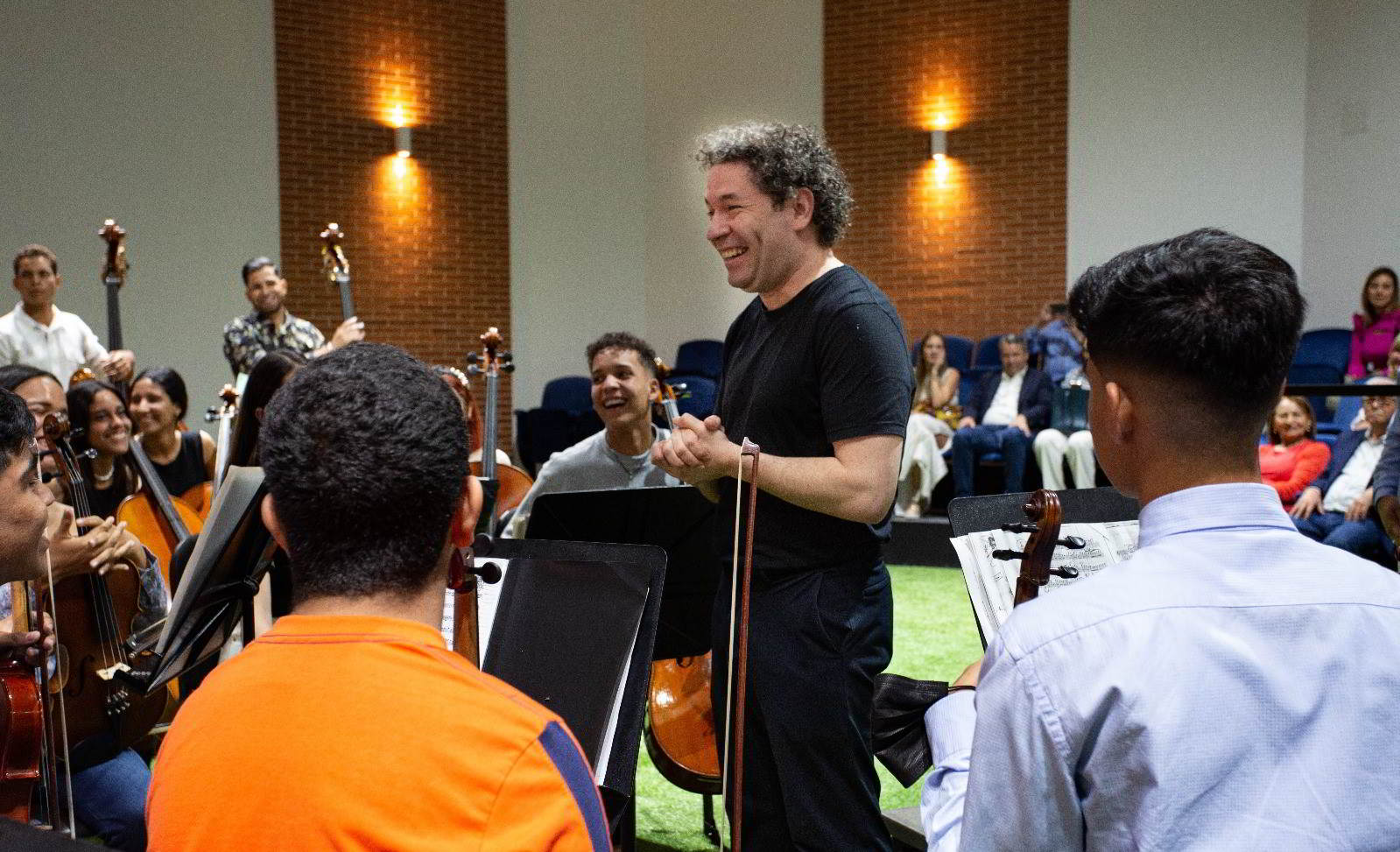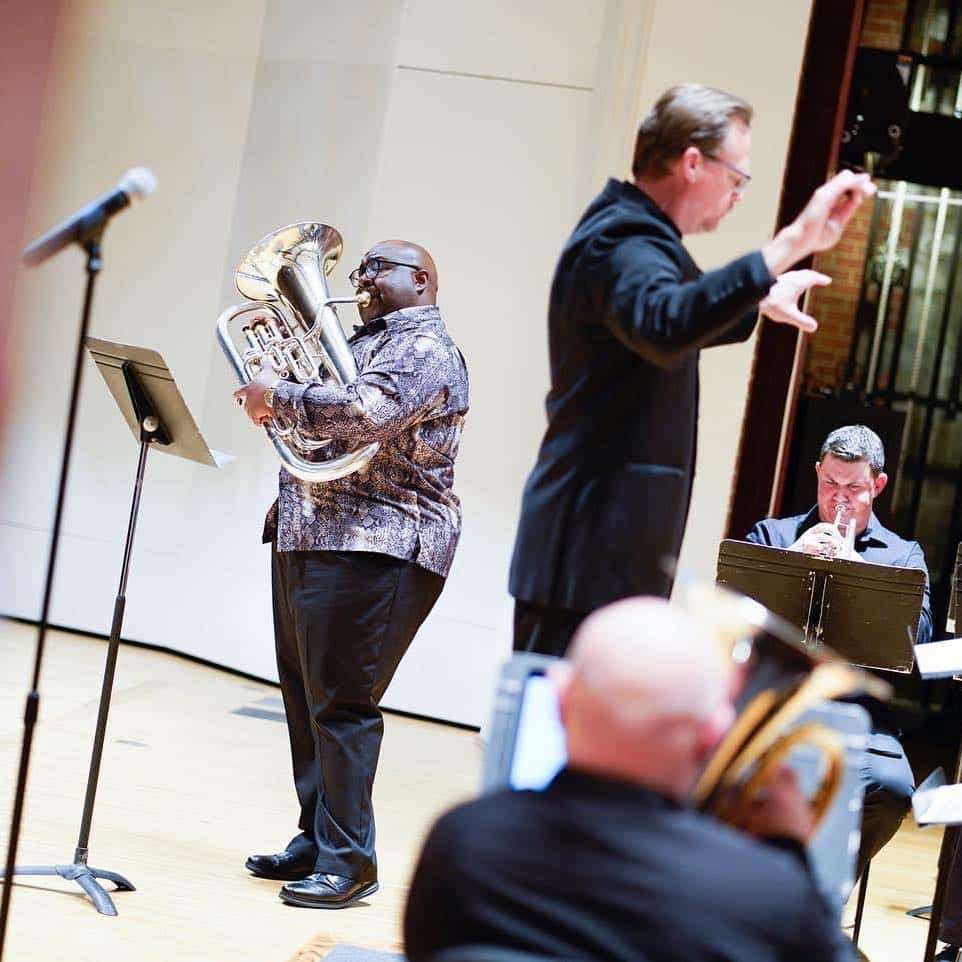NY Philharmonic: Dudamel jumps in
OrchestrasAlthough he does not become music director for another couple of years, Gustavo Dudamel is keeping close watch on events at the New York Philharmonic.
Next week, April 25-27, he’s jumping in for an unwell Juanjo Mena to conduct a program of Latin-themed music. It consists of Ginastera’s violin concerto and Sarasate’s Carmen Fantasy, soloist Hilary Hahn, along with Ravel’s Rapsodie espanole and Boléro.
That’s in addition to the orchestra’s Spring Gala on April 24.






Phil needs a hero right about now.
Phil needs a NEW BOARD right about now, as does the local opera company and a local university.
I don’t understand how Carmen is Latin-themed. Please explain.
It is set in Southern Spain.
Spain is in Europe, not Latin America. Violalib is right. Carmen is not Latin-themed, it’s Spanish themed & it takes place on an entirely different continent.
Are you serious?? Maybe watch the opera before you comment.
No, are YOU serious? Maybe check your geography before you comment. Spain is in Europe, not Latin America.
Spain and many conutries have their language originated from latin…
..errhhh… Latin, giving its language and culture to a colonial implantation, originote where?
Latinos are no more Spanish than British are American. Think before you comment.
100%. Perfect analogy. Thank you!
Oxford English Dictionary –> Latino/a
Chiefly U.S.
A person of Latin American origin or descent. Cf. Latinx, n.
Oxford English Dictionary –> Latin
1. [uncountable] the language of ancient Rome and the official language of its empire
2. [countable] a person from countries where languages that have developed from Latin, such as Spanish, Portuguese, Italian or French, are spoken
The program consists of a concerto by an Argentinian composer, another piece by a Spanish composer [Spain as in the European country, a Spaniard, Latin but not Latino], and a Spain [Europe]-inspired piece by a French composer [also Latin, since french is a romance language, but not Latino].
The key point here is “of Latin American origin”. Spain is a European country. Its citizens are European, not Latin “x”.
Confusing Spain with Latin America is common for people in the US & it looks like maybe the UK, too.
This is exactly why the Catalan pop singer Rosalia has been publicly slammed for cultural appropriation. She’s a white, European woman from Barcelona, Spain & she won 7 Latin grammys. She’s not Latina.
But the post says “Latin-themed” – not Latino-themed – therefore Spain is relevant and the term is used correctly.
How exactly are you defining “Latin”?
Romanian, like Spanish, is a Latin-based language. So does George Enesco also belong on a “Latin-themed” program?
Why not?
Can we agree that both Bizet and Ravel, and Sarasate are “Latin” but not “Latino”? I mean, Rossini, Verdi, Puccini, Debussy, Vivaldi, Ravel, Enesco, Berio, Boulez, Sarasate, Albéniz, Granados, de Falla, Meyerbeer, Donizetti, Messiaen, and Respighi are all Latin and European, but NOT Latino or Latin American.
What Norman said is “Latin-theme”, not “Latino”. And three of the four works indeed are.
“Latin-themed” is an inaccurate catch-all phrase. It’s borderline ignorant. Music from Spain & Latin-America often gets lumped together because US audiences don’t know any better. They assume that all music from Spanish-speaking countries, no matter how distant or diverse, belongs under the same umbrella. No.
If you’re referring to works from or inspired by Spanish-speaking countries, “Hispanic-themed” or “Spanish & Latin-American themed” might be better.
Otherwise, where do you draw the line? French, Italian, Portuguese, even Romanian are all Latin-based languages. Following your logic, you could do a program of Debussy, Rossini & Ligeti & call it “Latin-themed”.
In this article, the term “Latin-themed” was used carelessly. Just pointing out the problems with that.
Colombian / native Spanish-speaker here. Thanks for the clarification for all who do not know what the differences are. I don’t know why is so difficult to make distinctions for many English-speaking people between Latin Americans and Spaniards. We share many cultural traits (architecture, some foods, religious celebrations), for sure, as current Latin American countries were part of the Spanish Empire. But from there to say that all Spanish-speaking countries are the same is typically gringo ignorance. They basically assume all Spanish-speaking nations are “Mexican”, Spain included. It’s ridiculous and there is no excuse for such blatant ignorance.
This! Thank you, Alejandro. You’ve explained it perfectly with a first-hand account.
That’s it: in the US, everyone from a Spanish-speaking country is assumed to be Mexican. It’s pure ignorance.
It’s amusing to Spaniards that in the US they consider Spanish-speakers to be of a different race, which they call “Hispanic”. You see it on applications, forms, everything. Spaniards speak Spanish, but they are 100% white European.
It is not out of ignorance these incomplete classifications are made. It stems from more than a century of US immigration policy.
The pedanticism is so thick in this thread you couldn’t cut it with a chainsaw.
No, Mr. Scharba. If you’re from Spain or Latin America it’s not pedantic at all.
Just to clarify: I saw Latin, not Latino. Hence my comment.
Just out of curiosity: why do you think the countries of what we broadly call Latin America are called Latin America? Do go back to the source.
Europeans often differentiate between one another as Latins as opposed to Germanics, Anglo-Saxons, Scandinavians, Slavics.
So following your definition, all Italian, French & Romanian composers also belong on a Latin-themed program?
Come on, you know exactly what “Latin-themed” in the context of the program described above means. It’s music from or about Spanish-speaking people from several different countries. Not music from countries populated by people with ties to civilizations which once spoke Latin. Come on.
“Hispanic-themed” or “Spanish & Latin-themed” would have been more accurate, but “Latin-themed” is easier to say. It’s incorrect.
Your comment must have been written really “carelessly”. Including Ligeti in your scenario does not make any sense because, though born in Romania, he was by all reasonable definitions a Hungarian Jew – therefore definitely not Latin. Calling Spanish themes Latin-related, on the other hand, makes perfect sense and is in fact fully accurate.
Sarasate was born in Spain but lived & died in France. So according to you he was French not Spanish. Try again.
Where is Sarasate from? There you’ll find your answer..
he certainly has the free time, by today’s maestro standards, unless you have 4 orchestras, you’re basically unemployed
spring gala on April 24, to celebrate the start of the second sex investigation, I hope they raise a lot of money, the first investigation cost them $500,000 and look at what that bought them
the Phil doesn’t need a hero, but it needs a cop
It needs both.
Sounds like an upgrade to me!
It certainly makes sense, if he has time.
Wow, what a program.
Not surprised that people are calling out sick to the NY Phil right now. I’m feeling pretty sick myself.
That’s easy music, he can just wing it. More important is his presence as a morale booster.
morale booster not necessarily moral booster,
hero not necessarily savior,
the history of conductors have had far more sinners than saints (well, isn’t that true for humanity in general, I must concede)
don’t look to Dudamel (even if he were the messiah of music) for the way out of the wilderness, look at the people who already have tenure and will be there for another 25-30 years, they control the culture of the Philharmonic more than any music director who may be gone after 5 years or maximum 10 years
Yeah, Ginastera violin concerto is SO easy, especially for the soloist
The Ginastera Violin Concerto, for one, is neither easy to play or to conduct.
One person”s name has not popped up once in all these posts and discussions: Jaap van Zweden.
You would think the music director would get a bit of the heat, fairly or not, but because of the pandemic, because of his shortest tenure since Boulez, because he was so detached and flew into NY only for concerts, because the NYT critics so dismissed him as irrelevant, because of his early exit, because of the adoring focus on his successor, he is counting his lucky stars: not his problem before, not his problem now, not his problem by the end of this season.
Bye bye New York, bonjour Paris.
In life, timing is everything.
When van Zweden announced that his final concert with NY will be Mahler’s Resurrection Symphony, the NYT snarkily asked, “Those with a taste for dry humor might ask themselves what exactly it is that Jaap van Zweden plans to resurrect?”
(yeah, the NYT classical music department could be very bitchy that way)
Well, like I said, in life, timing is everything.
Now more than ever, it is the New York Philharmonic that needs to be resurrected.
The New York Times classical music section can be as bitchy as they like, if they didn’t have 2 strikes against them, failing to break the stories of the decade involving 2 hometown institutions among the most emblematic of the city, the Met and the namesake Philharmonic.
That snarky sentence about Jaap would never have made it to print had the NYT been in the midst of investigating the NY Philharmonic at the time, because they would’ve known back then that something is rotten in the state of Denmark (I mean, David Geffen Hall).
Now they come across as cluelessly petty and catty.
Let not there be a third strike, even if cats have nine lives.
The NY Times continues to support the bitchy Zachary Woolfe. As long as he remains, the music criticism will continue to be substandard.
Bitchy is the perfect adjective for Zachary Woolfe. NYTimes could do so much better.
Where are the great conductors now? Where are the Abbados, Bernsteins, Karajans, Walters, Klemperers and Toscaninis?
Instead there’s Ken Doll other wannabees.
The “great conductors” of previous years did not usually have highly-paid PR agents (apart, maybe, those who worked in America). Highly-pad PR agents for Pierre Monteux, Günter Wand, Wilhem Furtwängler?
The world was much smaller back then…..We live in another world now. You can´t turn back the clock.
The lament of the goners..They were good for their days.There are far better ones today….Times change, style, repertoire….Ridiculous dwelling on the past. Karajan´s Mantovani one size fits all muzak? Gimme a break…..
You’re picking six generational talents from a century of conducting. And people remembered to a large extent from their latter years. In their younger days they got blasted by critics, too. The main reason people think poorly of today’s conductors is that they’re not old or dead yet.
I hope Juanjo Mena is doing okay!!!
No one better to take over with this program!
The Dude is the best ambassador to get the NY Phil past its’ problems. He is a master of marketing.